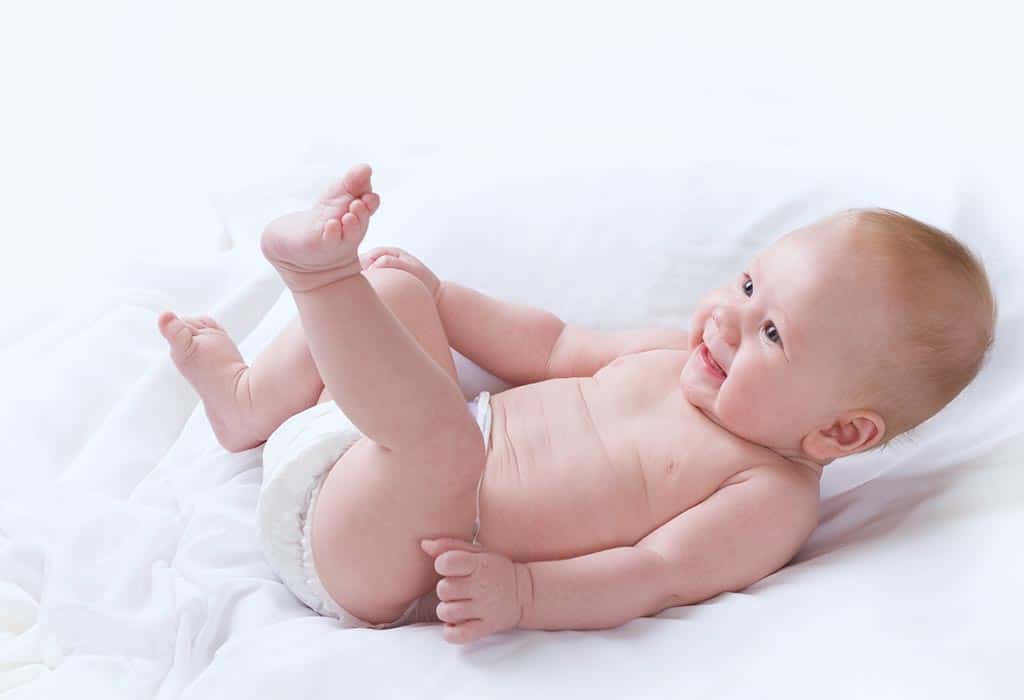
Table of Contents
Baby’s first giggle and chuckles! Let’s talk about the harsh truth behind postpartum hair fall, how to deal with hair loss, and how to not obsess about something so normal. The little one is now using up bottles at a pace faster than before. As your baby achieves milestones on milestones, let’s also have a look at the best bottle racks to make your life simpler, shall we?
Your baby's fourteenth week after birth
At 14 weeks old, your little one will already be spotting the difference between a real, actual thing/person and a photograph or a virtually available thing/person. Though your baby will not be able to communicate the difference to you in their voice yet, you can expect to witness a lot more giggles, smiles, coos, and responses when you are available physically around them v/s when you are on a video call with them or show them a picture of someone not physically available. Your baby will also now develop more sense of self and will probably enjoy looking at themselves in the mirror, often smiling at themselves as they peek into the mirror.
What’s more? Your baby’s vision and eyesight as well as the understanding of colors will now be more advanced which means that your baby can now literally see the world in all colors. Your baby will also start enjoying music and melody that they earlier didn’t care much about and will perhaps show signs of intrigue when you sing them a lullaby to sleep. They’ll also, perhaps, display their social nerves by interacting more with visitors at 3 and a half months old!
Your 14-week-old baby's development and physical growth
With an increased awareness of self and in between manifesting a personality for themselves, there’s a lot happening with your 14-week old baby to take note of.
1. Your baby's senses
Having only recently developed an awareness of their limbs in the previous week, your baby will tend to display a heightened curiosity to explore their body. Typically, babies are noticed to be enthralled by their toes and feet to an extent they are on a constant mission to reach the toes with their mouth!
2. Your baby's energy levels
As a growing infant, by the 14th week, your baby will also tend to show a high energy level which means that they’d perhaps sit still only when asleep!
3. Your baby's reflexes
At week 14, your baby will gain complete control over their head and will develop a bi-dextrous grasp enabling them to consciously reach out for things around them. They’ll also now start reaching out for your face, wanting to touch it every time you go closer. Their communication skills in the form of constant coos, giggles, and laughter will develop too.
4. Your baby's developing social skills
Once into week 14, typical babies get rid of stranger anxiety and start responding to visitors at home. Most babies will not mind being held by unknown people, however, be wary to not put them into the hands of strangers if they’re hungry or sleepy.
5. Your baby's eye color
At 3 and a half, most likely than not, your baby will get rid of the eye color they were born with and you may notice a transitioning eye color. In most cases, babies with dark eyes don’t tend to lose color or become lighter, while on the other hand, babies with a light eye color like a pale blue or a caramel brown might display a change to deeper shades of blue and brown respectively.
Your 14-week-old baby's health
Tests and Vaccinations
There are certain tests and vaccinations you’ll need to be prepared to take your baby for at 14 weeks old. Ensuring timely administration of vaccines is very important because not only does it aid a healthy, high-immunity baby but also protects your baby from a fatal illness. The DPT/IPV/HIB triple vaccine for diphtheria and polio and the third dosage of the PCV, rotavirus vaccine are typically given at this time. It should be noted that your baby may run a fever as a result of the vaccinations and though it may feel like a big deal, there’s absolutely nothing to worry about. You may want to reach out to a doctor only if the fever is accompanied by vomiting and/or if the temperature goes above 100.5 degrees.
Postpartum baby tips: Week 14 after birth
Here’s what you should be looking out for when taking care of your baby three and a half month into birth-
1. Feeding your baby
By now, you should ideally have a feeding schedule for your baby in place. Bringing in the discipline at this point is crucial because you may, otherwise, find your baby reaching out for their bottle or your breast (in case you are breastfeeding) for milk at random times of the day; even at inconvenient times when you’re already in the middle of something. Since your baby’s feed is now increasing and gaining an order, it may be a good idea to use milk storage bags to store the baby’s food ready for when you’re not around. Your baby will also like to engage with you a lot at this age and so, it may be a good idea to use accessories like a baby bottle drying rack and baby wipe warmer to cut down your time spent on handling chores and using that time to bond with the baby.
2. Sleeping patterns
Though your baby’s feed may be in control by now, it may not so necessarily be the case with their sleep as yet. Your baby will need more restorative energy and so might nap as well as wake up for food at random times. you may also meet mammas who may boast about how their baby has already adapted to an orderly sleep schedule but this is when you need to understand that all babies have varied physiological needs causing them to behave differently. Try and ensure that your baby gets to sleep comfortably for a long stretch at least once in the day so as to make sure their sleep-aided growth and development are not hindered.
Final Thoughts: Dealing with postpartum hair loss
As a new mother, while you try and make sense of most things, struggling to get your life back to normalcy, be prepared to deal with terrifying hair loss at around 3 months postpartum. The gorgeous and luscious locks that you were so obsessed with during pregnancy will now go back to their usual self as your body’s hormonal balance comes back to what it was pre-pregnancy.
Having said that, there’s nothing to be quite worried about as this rapid hair loss will not last forever and your hair will return to the pre-pregnancy growth cycle in another couple of months. If you still have a reason to believe that your hair loss is abnormal and that you are losing a little too much hair than anticipated, it may be a good idea to double-check with your doctor for assurance.
FAQs- Your 14-Week-Old Baby: Development, Growth, Health, Postpartum, New Baby Tips & Recommended Products
1.What is the red reflex eye test for babies?
2. Can I give water to my 14-week old baby?
3. What should I expect from my 14-week old baby?
Reviewed By-

Nimrat, Pediatrics
Dr. Nimrat S Sidhu is a practicing pediatrician for about 5 years now and holds an MD pediatrics degree. She was the topper of her batch, has always had a keen interest in her core medical field, and is specially trained for neonatal resuscitation.










